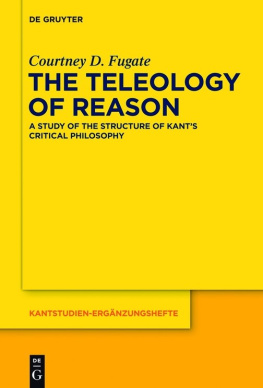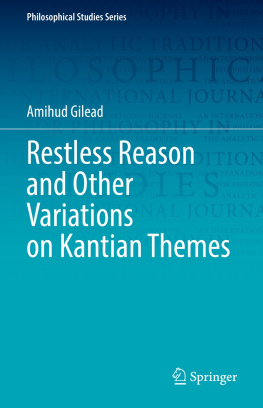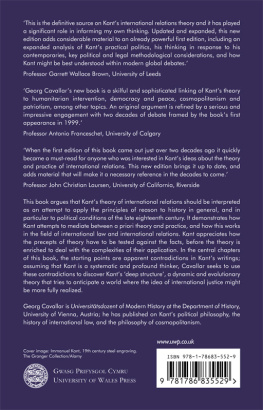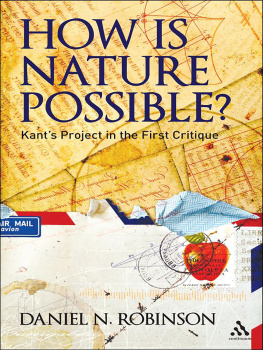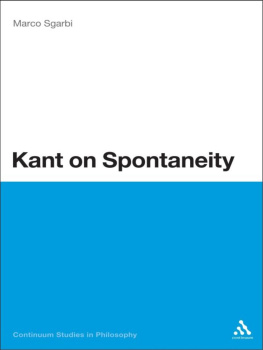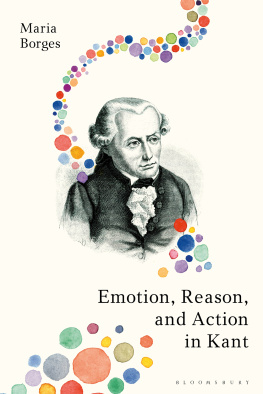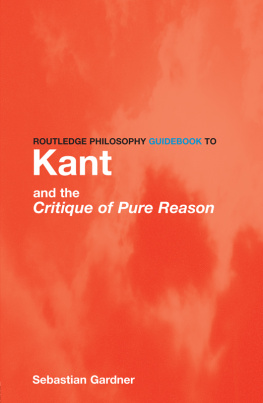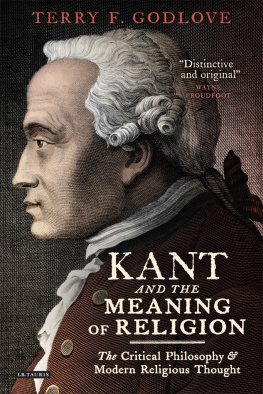Fugate - The Teleology of Reason: a Study of the Structure of Kants Critical Philosophy
Here you can read online Fugate - The Teleology of Reason: a Study of the Structure of Kants Critical Philosophy full text of the book (entire story) in english for free. Download pdf and epub, get meaning, cover and reviews about this ebook. City: Berlin, year: 2014, publisher: De Gruyter, Inc., genre: Politics. Description of the work, (preface) as well as reviews are available. Best literature library LitArk.com created for fans of good reading and offers a wide selection of genres:
Romance novel
Science fiction
Adventure
Detective
Science
History
Home and family
Prose
Art
Politics
Computer
Non-fiction
Religion
Business
Children
Humor
Choose a favorite category and find really read worthwhile books. Enjoy immersion in the world of imagination, feel the emotions of the characters or learn something new for yourself, make an fascinating discovery.
- Book:The Teleology of Reason: a Study of the Structure of Kants Critical Philosophy
- Author:
- Publisher:De Gruyter, Inc.
- Genre:
- Year:2014
- City:Berlin
- Rating:5 / 5
- Favourites:Add to favourites
- Your mark:
- 100
- 1
- 2
- 3
- 4
- 5
The Teleology of Reason: a Study of the Structure of Kants Critical Philosophy: summary, description and annotation
We offer to read an annotation, description, summary or preface (depends on what the author of the book "The Teleology of Reason: a Study of the Structure of Kants Critical Philosophy" wrote himself). If you haven't found the necessary information about the book — write in the comments, we will try to find it.
Fugate: author's other books
Who wrote The Teleology of Reason: a Study of the Structure of Kants Critical Philosophy? Find out the surname, the name of the author of the book and a list of all author's works by series.
The Teleology of Reason: a Study of the Structure of Kants Critical Philosophy — read online for free the complete book (whole text) full work
Below is the text of the book, divided by pages. System saving the place of the last page read, allows you to conveniently read the book "The Teleology of Reason: a Study of the Structure of Kants Critical Philosophy" online for free, without having to search again every time where you left off. Put a bookmark, and you can go to the page where you finished reading at any time.
Font size:
Interval:
Bookmark:
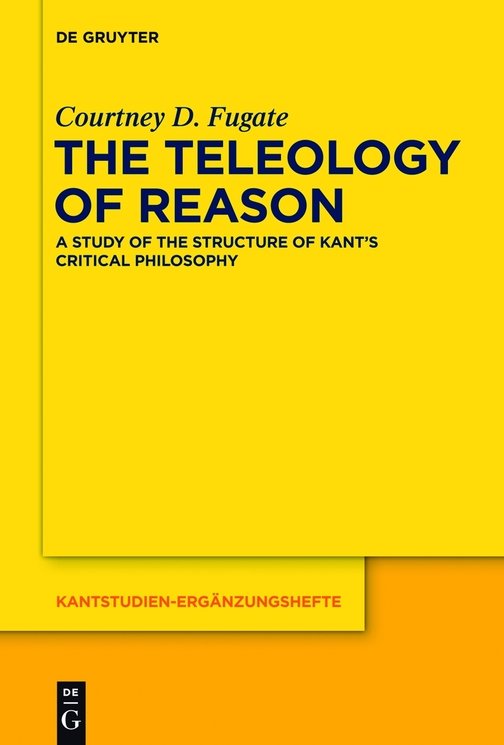
Unless otherwise noted, translations used in this work are from the Cambridge Edition of the Works of Immanuel Kant, edited by Paul Guyer and Allen W. Wood, published by Cambridge University Press. On occasion, I also quote from the following translations of Kants works.
GMS
Paton, H. J. (Trans.)(1964): New York: Harper & Row.
KpV
Beck, Lewis White (Trans.)(1993): New York: Macmillan Publishing Company.
Pluhar, Werner S. (Trans.)(2002): Indianapolis: Hackett Publishing Company.
KrV
Smith, Norman Kemp (Trans.)(1965): New York: St Martins Press.
KU
Meredith, James Creed (Trans.)(1952): Oxford: Clarendon Press.
Pluhar, Werner S. (Trans.)(1952): Indianapolis: Hackett Publishing Company.
Prol
Carus, Paul (Trans. 1977): Revised by James W. Ellington. Indianapolis: Hackett.
Lucas, Peter G. (Trans.)(1959): Manchester: University Press.
Aquinas, St. Thomas (1997): Basic Writings of Saint Thomas Aquinas. Vol. 1. Pegis, Anton C. (Ed.). Indianapolis: Hackett.
Aristotle (1968). Physics. In: Aristotle in Twenty-Three Volumes. Loeb Classical Library. Wickstead, H. P. and F. M. Cornford (Trans.). Vols. 5 and 6. Cambridge: Harvard University Press, 1968.
Aristotle (1970): Aristotles Metaphysics. Apostle, Hipocrates G. (Trans.). Bloomington: Indiana University Press.
Aristotle (1999): Aristotles Metaphysics. Sachs, Joe (Trans.). Santa Fe: Green Lion Press.
Arnauld, Antoine and Pierre Nicole (1996): Logic or the Art of Thinking. Jill Vance Buroker (Trans.). Cambridge: Cambridge University Press.
Ayer, Alfred Jules (undated): Language, Truth and Logic. New York: Dover Publications.
Ayer, Alfred Jules (2006): Probability & Evidence. New York: Columbia University Press.
Bacon, Francis (2000): The New Organon. Jardine, Lisa and Michael Silverthorne (Eds.). Cambridge: Cambridge University Press.
Baumgarten, Alexander Gottlieb (1973): Acroasis Logica in Christianum L. B. De Wolff. Hildesheim: Georg Olms Verlag.
Baumgarten, Alexander Gottlieb (2004): Metaphysik. Meier, Ge. Friedr. (Trans.), with remarks by Joh. Aug. Eberhard. Second edition, 1783. Jena: Dietrich Scheglmann Reprints.
Bergson, Henri (1911): Creative Evolution. Mitchell, Arthur (Trans.). New York: Henry Holt.
Brucker, Johann Jakob (17421744): Historia Critica Philosophiae. 6 Vols. Leipzig.
Crusius, Christian August (1749): Anleitung ber natrliche Begebenheiten ordentlich und vorsichtlich nachzudencken. Parts I and II. Leipzig: Johann Friedrich Gleditsch.
Crusius, Christian August (1751): Anweisung vernnftig zu leben. Second enlarged edition. Leipzig: Johann Friedrich Gleditsch.
Crusius, Christian August (1766): Ausfrliche Abhandlung von dem rechten Gebrauche und der Einschrnkung des sogenannten Satzes vom Zureichenden oder besser Determinirenden Grunde. Translated from Latin into German by Christian Friedrich Krause. Leipzig: Johann Christian Langenheim.
Crusius, Christian August (1964): Entwurf der nothwendigen Vernunft-Wahrheiten, wiefern sie den zuflligen entgegen gesetzt werden. Die philosophische hauptwerke. Vol. 2. Hildesheim: Georg Olms.
Crusius, Christian August (1965): Weg zur Gewissheit und Zuverlssigkeit der menschlichen Erkenntnis. Die philosophische hauptwerke. Vol. 3. Hildesheim: Georg Olms.
Chisholm, Roderick M (1946): The Contrary-To-Fact Conditional. In: Mind, p. 289307.
Copernicus, Nicholas (1995): On the Revolutions of the Heavenly Spheres. Wallis, Charles Glenn (Trans.). Amherst: Prometheus Books.
Davidson, Donald (1980): Essays on Actions and Events. Oxford: Clarendon Press.
Descartes, Ren (1985): The Philosophical Writings of Descartes. Cottingham, John and Robert Stoothoff and Dugald Murdoch (Trans.). 3 Vols. Cambridge: Cambridge University Press.
Ducasse, C. J (1949): Explanation, Mechanism, and Teleology. In: Readings in Philosophical Analysis. Feigl, Herbert and Wilfrid Sellars (Eds.). New York: Appleton-Century-Crofts, p. 540544.
Enfield, William (2001): The History of Philosophy. From the Earliest Periods: Drawn Up From Bruckers Historia Critica Philosophiae. Vols. 1 and 2. 1837. With an introduction by Knud Haakonssen. No place of publication given: Thoemmes Press.
Epictetus (1807): The Works of Epictetus. Carter, Elizabeth (Trans.) Vol. 2. London: Rivington.
Feynman, Richard (1944): The Character of Physical Law. New York: Modern Library.
Fichte, Johann Gottlieb (1845/6): Johann Gottlieb Fichtes smmtliche Werke. Ed. Immanuel Hermann Fichte.
Fichte, Johann Gottlieb (1834/5): Johann Gottlieb Fichtes nachgelassene Werke. Ed. Immanuel Hermann Fichte.
Fichte, Johann Gottlieb (1982): Science of Knowledge. Heath, Peter and John Lachs (Ed. and Trans.). Cambridge: Cambridge University Press.
Fichte, Johann Gottlieb (1987): The Vocation of Man. Preuss, Peter (Trans.). Indianapolis: Hackett Publishing Company.
Fichte, Johann Gottlieb (1992): Foundations of Transcendental Philosophy: (Wissenschaftslehre) nova method (1796/99). Breazeale, Daniel (Ed. and Trans.). Ithaca: Cornell University Press.
Fichte, Johann Gottlieb (1993): Fichtes Wissenschaftslehre of 1794: A Commentary on Part 1. Heath, Peter and John Lachs (Trans.). With a commentary by George J. Seidel. West Lafayette, IN: Purdue University Press.
Fichte, Johann Gottlieb (1994): Introductions to the Wissenschaftslehre (17971800). Breazeale, Daniel (Ed. and Trans.). Indianapolis: Hackett Publishing Company.
Fichte, Johann Gottlieb (2001): Review of Leonard Creuzer, Skeptical Reflections on the Freedom of the Will, with Reference to the Latest Theories of the Same, with a Foreword by Professor Schmid. In: The Philosophical Forum. Daniel Breazeale (Trans.), p. 28996.
Fichte, Johann Gottlieb (2005a): The Science of Knowing: J. G. Fichtes 1804 Lectures on the Wissenschaftslehre. Wright, Walter E. (Trans.). New York: SUNY.
Fichte, Johann Gottlieb (2005b): The System of Ethics. Breazeale, Daniel and Gnter Zller (Eds.) Cambridge: Cambridge University Press.
Frege, Gottlob (1980): The Foundations of Arithmetic: A Logico-Mathematical Inquiry into the Concept of Number. Austin, J. L. (Trans.). Evanston: Northwestern University Press.
Goodman, Nelson (1983): Fact Fiction and Forecast. Cambridge, Mass.: Harvard University Press.
Gottsched, Johann Christoph (1756): Erste Grnde der gesammten Weltweisheit. Sixth and improved edition. Vol. 1. Leipzig: Breitkopf.
Hegel, G. W. F. (1968): Lectures on the History of Philosophy. Vol. 3. Haldane, E. S. and Frances H. Simon (Trans.). London: Routledge and Kegan Paul.
Hegel, G. W. F. (1974): Lectures on the Philosophy of Religion: Together with a Work on the Proofs of the Existence of God. Vols. I-III. Speirs, E. B. and J. Burdon Sanderson (Trans.). New York: Humanities Press.
Hegel, G. W. F. (1987): Lectures on the Philosophy of Religion: Vol. 2 Determinate Religion. Hodgson, Peter C. (Ed.) and R. F. Brown, P. C. Hodgson, and J. M. Stewart (Trans.). Berkeley: University of California Press.
Hegel, G. W. F. (1990): Wissenschaft der Logik: Die Lehre vom Sein (1832). Hamburg: Felix Meiner Verlag.
Hegel, G. W. F. (1991): The Encyclopedia Logic: Part I of the Encyclopedia of Philosophical Sciences with the Zustze. Geraets, T. F. and W. A. Suchting and H. S. Harris (Trans.). Indianapolis: Hackett Publishing Company.
Hegel, G. W. F. (1993): Science of Logic. Miller, A. V. (Trans.). Atlantic Highlands: Humanities Press International.
Font size:
Interval:
Bookmark:
Similar books «The Teleology of Reason: a Study of the Structure of Kants Critical Philosophy»
Look at similar books to The Teleology of Reason: a Study of the Structure of Kants Critical Philosophy. We have selected literature similar in name and meaning in the hope of providing readers with more options to find new, interesting, not yet read works.
Discussion, reviews of the book The Teleology of Reason: a Study of the Structure of Kants Critical Philosophy and just readers' own opinions. Leave your comments, write what you think about the work, its meaning or the main characters. Specify what exactly you liked and what you didn't like, and why you think so.

